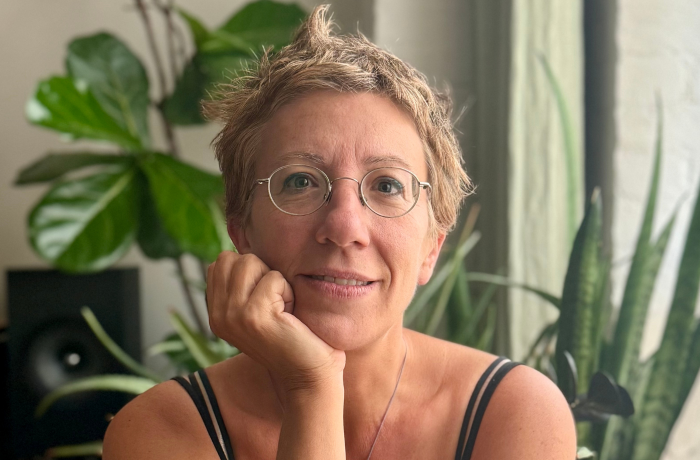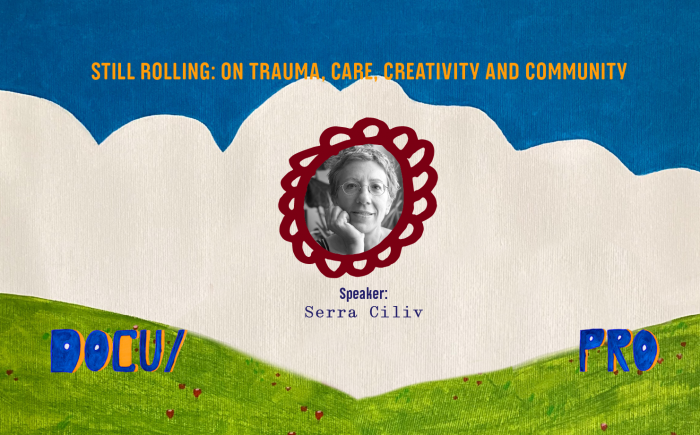
Today, DOCU/PRO is the largest professional platform for non-fiction filmmakers in Ukraine. Various educational and film production projects occur within its framework, showcases are held, and networking events for documentary filmmakers are organised. This year, holders of industry accreditation can expect an intense program of events and a separate day dedicated to improving mental health in the film industry.
Serra Civil, an expert in the trauma-informed approach in filmmaking, will be a guest of DOCU/PRO and will conduct an open online seminar. On the eve of the festival, film curator Olga Birzul spoke with Serra about sensitivity in the documentary industry.
Serra, what sparked the idea of organising training sessions on mental health and a trauma-informed approach for documentary filmmakers? What was the driving force behind creating such a project?
I'm part of Film in Mind, a collective of mental health practitioners working to support mental well-being in the documentary world. We all come from the film industry ourselves — before becoming therapists and coaches, we worked in different parts of the film industry, so we have firsthand experience of how little mental health support there often is. The idea for these trainings came from seeing a fundamental gap: documentary makers are diving into some of the world's most complex and urgent issues — war, injustice, displacement — but they're often left entirely on their own to handle the emotional and ethical burden. We wanted to create something that not only gives filmmakers tools to navigate trauma responsibly but also acknowledges how deeply this work impacts them, their teams, their contributors, and their audiences. Our driving force is simple: care for the people behind essential stories, not just the stories themselves.
Documentary filmmakers may believe the camera shields them from the harsh realities they capture, creating a sense of distance. Yet, this is a dangerous illusion, and they frequently overlook their need for self-protection. Why has the conversation around mental health in the film industry taken so long to emerge?
That is such a good question. I think part of the answer is the stigma around mental health: we're taught to see emotional struggles as personal failings instead of signs of systemic problems. In the documentary world, filmmakers also feel a tremendous urgency to focus on the story and its impact, often at the expense of their well-being. And, of course, the economic precarity of documentary work makes it even harder for filmmakers to prioritise their mental health. Systemic change is needed across the whole industry — from broadcasters and commissioners to festivals — so that care for the world includes care for the people creating these films.
Lecture on Mental Health Support for Filmmakers as Part of DOCU/PRO Events.
The Russian-Ukrainian war is now the most documented. In our urgency to expose Russian war crimes, we sometimes overlook sensitivity towards each other. A significant discussion in Ukraine concerns the ethics of documentary filmmakers filming during the most tragic moments of their subjects' lives. What key principles of trauma-informed communication should these filmmakers prioritise when interacting with individuals who have experienced war trauma?
When you're filming people who've lived through trauma, it's about making sure they feel safe while telling their story. That means being careful not to push them into moments too painful to revisit and letting them set the pace and boundaries of what they want to share. It's also about getting real, informed consent — not just once, but throughout the whole process — and making sure they feel in control of their story, not like it's being taken from them. Staying tuned into their emotions, being humble about what we don't know, and constantly asking ourselves whether the way we tell these stories could cause more harm. These ideas aren't just ethical guidelines; they shape how deeply people trust us and how we honour their experiences. In my presentation, I'd love to dive deeper into these ideas.
Drawing on your experience as a psychotherapist, I'm compelled to ask about retraumatisation. Given the prolonged stress experienced by Ukrainian society, many are hesitant to watch documentaries they perceive as psychologically challenging. What recommendations do you have for inspiring people to engage with challenging films?